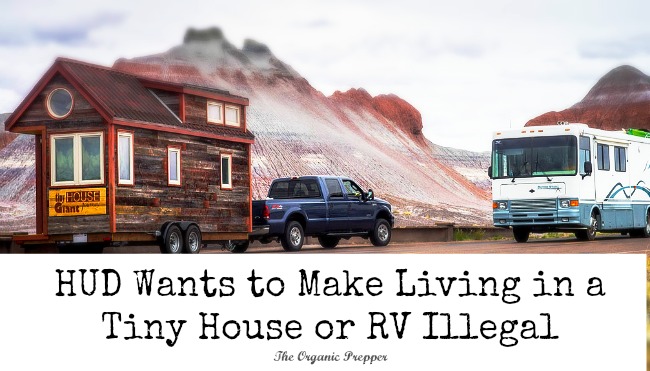March 31, 2016

The tiny house movement has taken America by storm, in part because our economy is in the toilet. People are striving to reduce their expenses by embracing minimalism. They’re breaking free from the corporate grind because, as I’ve always advised, they are learning to live with less and radically reducing their expenses.
But, these days in America, you are sharply admonished when you try to live your life outside of the strictures of the 9-5 world. Is it any surprise that the government is now taking steps to limit our ability to drastically reduce our expenses? They always seem to make illegal anything we try to do to be more independent and moving into a tiny house appears to be the next on their list.
HUD has proposed the following law:
This proposed rule would modify the current exemption for recreational vehicles in the Manufactured Home Procedural and Enforcement Regulations. Under the current exemption, questions have arisen regarding whether park model recreational vehicles are regulated by HUD’s manufactured home program. These park models are being produced with patio roofs, screened in porches, and other extensions that exceed the 400 square foot maximum exemption in the current regulations. Additionally, some of these models are being marketed as suitable for year round living. HUD’s proposed rule would permit recreational vehicle manufactures to certify that a unit is exempted from HUD’s regulations. Specifically, HUD’s proposed rule would define a recreational vehicle as a factory build vehicular structure, not certified as a manufactured home, designed only for recreational use and not as a primary residence or for permanent occupancy, and built and certified in accordance with either the National Fire Protection Association (NFPA) 1192-2015, Standard for Recreational Vehicles, or the American National Standards Institute (ANSI) A119.5-15, Recreational Park Trailer Standard. In addition, to provide consumers notice regarding the manufacturing standards used to construct the unit, HUD’s rule would require that units claiming the exemption display a notice that identifies the standards used to construct the unit and states that the unit is designed only for recreational use, and not as a primary residence or permanent dwelling.
That’s right – if this law is passed, living in a tiny house or an RV may become illegal in April of this year.